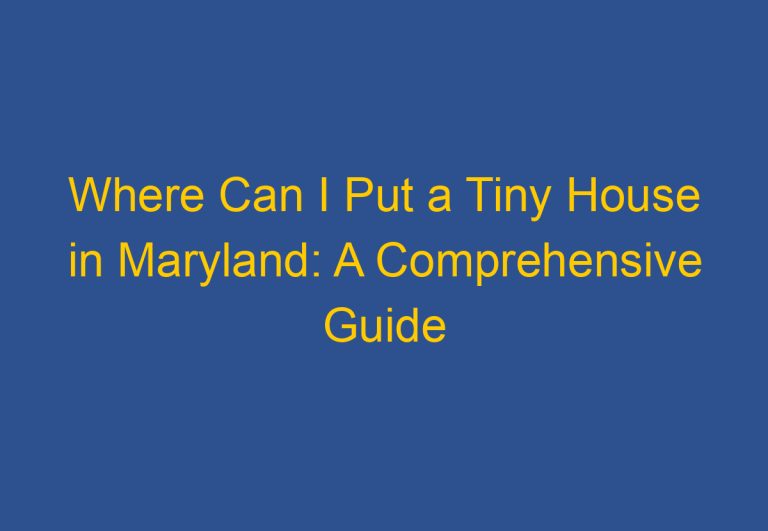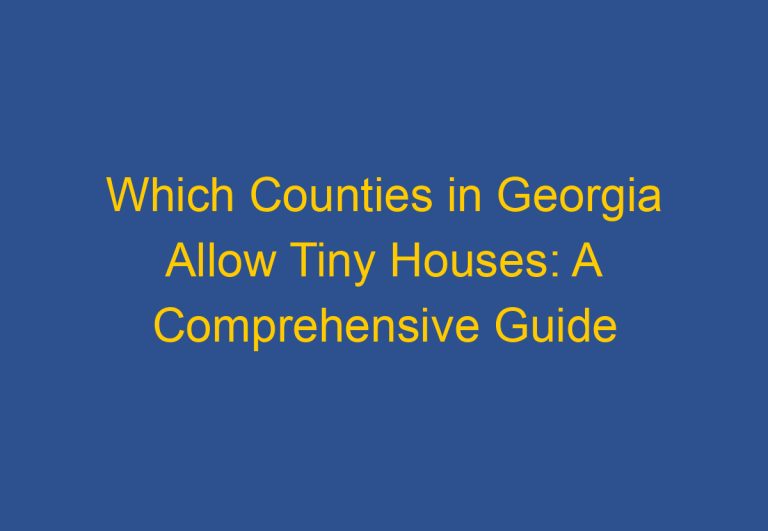Can a Tiny House Be Used as an RV? Exploring the Possibilities
Tiny houses have been growing in popularity as a way to downsize and live a more minimalist lifestyle. However, many people wonder if a tiny house can also be used as an RV. The short answer is yes, a tiny house can be used as an RV, but there are some important considerations to keep in mind.
When it comes to using a tiny house as an RV, the main factor to consider is whether or not it is street legal. In most cases, tiny houses are built on trailers and can be towed by a vehicle. However, if the tiny house does not meet certain specifications, it may not be considered street legal and cannot be used as an RV. Additionally, some states have specific laws and regulations regarding tiny houses on wheels and how they can be used.
Another important consideration when using a tiny house as an RV is the level of mobility and convenience it provides. While a tiny house can certainly be used for road trips and travel, it may not be as easy to maneuver and park as a traditional RV. Additionally, tiny houses may not have all of the amenities and features that are typically found in RVs, such as holding tanks, generators, and built-in water systems. Overall, using a tiny house as an RV can be a great option for those who want to travel and live small, but it is important to do your research and make sure that you are meeting all legal requirements and practical considerations.
Understanding Tiny Houses as Recreational Vehicles
Defining the Tiny House and RV Concepts
Before diving into the legalities and regulations surrounding tiny houses as recreational vehicles, it is important to first define what these concepts mean. A tiny house is a small, typically mobile, dwelling that is often built on a trailer and designed to be used as a permanent or semi-permanent residence. On the other hand, a recreational vehicle (RV) is a motorized or towable vehicle that is designed to be used for temporary living quarters for recreational, camping, or travel purposes.
Legalities and Regulations
When it comes to using a tiny house as an RV, there are several legalities and regulations that must be considered. For example, building codes and zoning laws vary from state to state and can impact the construction and placement of a tiny house. Additionally, certification and registration requirements may also vary depending on the state and whether the tiny house is considered a mobile home or RV.
One way to register a tiny house as an RV is to have it inspected by an inspector from the local office of the Department of Motor Vehicles (DMV) or under alternative programs. The American National Standards Institute (ANSI) and the National Fire Protection Association (NFPA) have also established standards for tiny homes on wheels to ensure safety and compliance with building codes.
Design and Customization
Design and customization are important factors to consider when using a tiny house as an RV. While tiny houses are often designed with a focus on sustainability and minimalism, RVs are typically designed with mobility and convenience in mind. Therefore, it is important to ensure that the tiny house is designed and customized to meet the specific needs and requirements of RV living, such as having adequate storage space and a functional kitchen and bathroom.
Overall, using a tiny house as an RV can be a unique and exciting way to experience mobile living. However, it is important to carefully consider the legalities and regulations surrounding this type of dwelling and ensure that it is designed and customized to meet the specific needs of RV living.
Living the Tiny House RV Lifestyle
Living in a tiny house RV can be a unique and fulfilling lifestyle for those who value mobility, comfort, and cost-efficiency. This section will explore some of the key aspects of the tiny house RV lifestyle, including mobility and travel, comfort and amenities, and costs and maintenance.
Mobility and Travel
One of the primary benefits of living in a tiny house RV is the ability to travel and explore new places while still having all of the comforts of home. Tiny house RVs are designed to be lightweight and easy to tow, making them ideal for road trips and camping adventures. They can be parked in a variety of locations, from RV parks to campgrounds to private land, giving owners the freedom to choose their own destinations.
Comfort and Amenities
Despite their small size, tiny house RVs can be surprisingly comfortable and well-equipped. Many models feature full kitchens, bathrooms, and living spaces, as well as ample storage and sleeping areas. Some even have built-in appliances like washers and dryers, making them suitable for full-time living. While the amenities and layout of a tiny house RV will vary depending on the model and manufacturer, most are designed with functionality and comfort in mind.
Costs and Maintenance
One of the biggest advantages of living in a tiny house RV is the cost savings compared to traditional home ownership. Tiny house RVs are often less expensive to purchase than a traditional home, and they require less maintenance and upkeep. Additionally, the smaller size of a tiny house RV means lower utility bills and reduced insurance costs. While there are still costs associated with owning and maintaining a tiny house RV, they are generally lower than those associated with a traditional home.
Overall, the tiny house RV lifestyle can be a rewarding and fulfilling way to live. Whether you’re looking for a way to travel and explore new places, or simply want to downsize and simplify your life, a tiny house RV can offer a unique and practical solution. From mobility and comfort to cost-efficiency and maintenance, there are many factors to consider when choosing to live in a tiny house RV.
Frequently Asked Questions
What are the cost differences between a tiny house and an RV?
When it comes to cost, tiny houses and RVs can vary greatly depending on the size, features, and materials used. Generally, a basic RV can be less expensive than a tiny house, but the cost can quickly add up with upgrades and customization. On the other hand, a tiny house can offer more space and amenities for the price, but the initial investment can be higher.
How does a tiny house compare to an RV and a mobile home in terms of mobility?
Tiny houses and RVs are both designed for mobility, but there are some differences. RVs are typically built on a chassis and can be driven on the road, while tiny houses are often built on a foundation and may require special permits to be moved. Mobile homes are designed to be more permanent and are not as easily moved as RVs or tiny houses.
What should I consider when looking for an RV certified tiny house for sale?
If you’re interested in purchasing an RVIA certified tiny house, there are a few things to keep in mind. First, make sure the certification is current and valid. You should also consider the size, features, and materials used in the construction of the tiny house. It’s also important to consider the weight and towing capacity of your vehicle if you plan on traveling with your tiny house.
Can a camper trailer be effectively converted into a tiny house?
Yes, a camper trailer can be converted into a tiny house with some modifications. However, it’s important to keep in mind that camper trailers are not built to the same standards as tiny houses and may require additional work to make them livable for long-term use.
What are the advantages of owning an RVIA certified tiny home?
An RVIA certified tiny home offers several advantages over a non-certified tiny house. First, it ensures that the tiny house meets certain safety and quality standards. It can also make it easier to obtain financing and insurance for your tiny house. Additionally, some RV parks and campgrounds may require RVIA certification for tiny houses to be allowed on their property.
Are there any legal or practical limitations to traveling with a tiny house as opposed to a traditional RV?
Yes, there may be some legal and practical limitations to traveling with a tiny house. Depending on the size and weight of your tiny house, you may need special permits to transport it on the road. Additionally, some states have restrictions on where you can park and live in a tiny house. It’s important to research the laws and regulations in your area before traveling with a tiny house.










